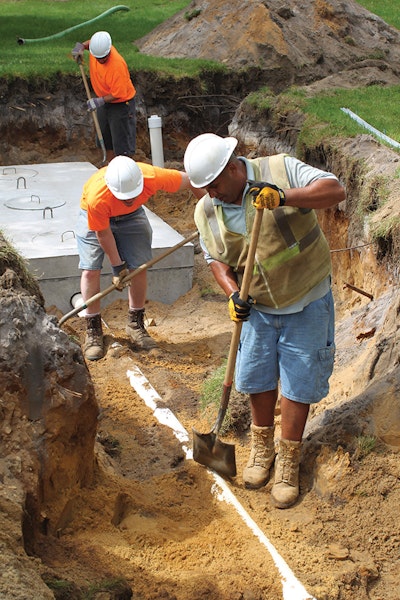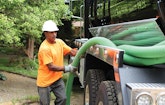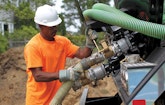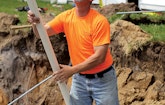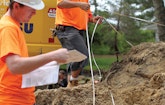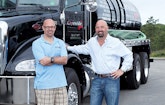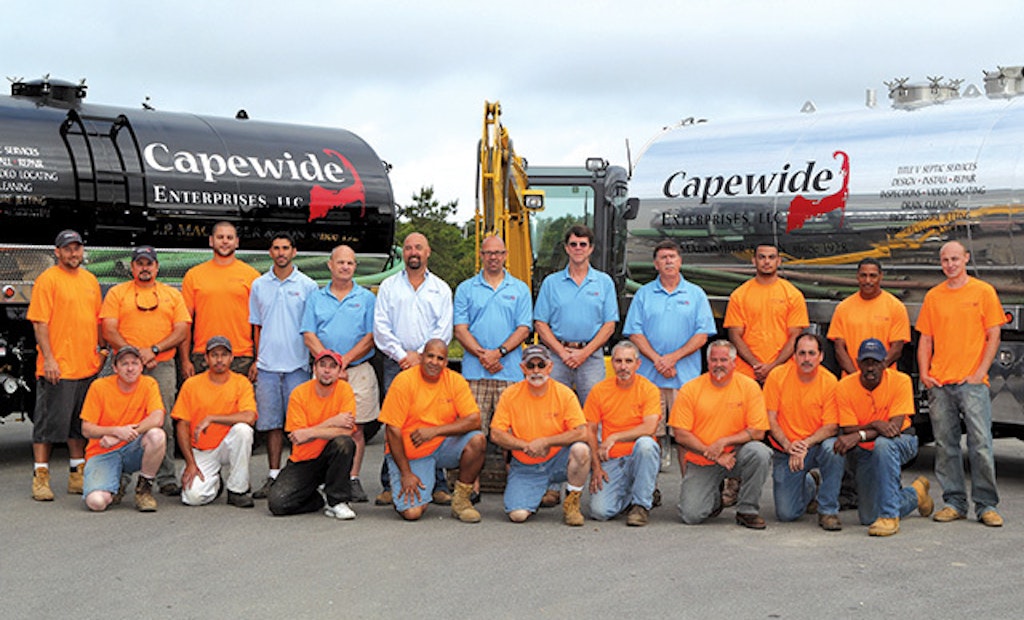
Interested in Trucks?
Get Trucks articles, news and videos right in your inbox! Sign up now.
Trucks + Get AlertsYou might think being located on a peninsula necessarily limits a small company's revenue potential. But don't mention that to Rich Capen, co-owner of Capewide Enterprises LLC with Joao Junqueira. Based in Mashpee, Mass., the company, providing pumping services and more, works well beyond the confines of its base on Cape Cod, reaching far and wide for revenue.
Capewide's services include commercial and residential pumping; Title 5 septic system repairs; custom home building, remodeling, additions and excavation; and covers 400 square miles, all of the Cape Cod region. Through diversification and some key acquisitions, the company has seen impressive growth, building from a startup to $5 million in revenue in eight busy years.
Launched in 2004 — after Junqueira built Capen's house and they got to talking about a business venture together — Capewide was originally a full-service construction company, offering excavation and septic system installation. It soon branched out into new areas, including onsite system upgrades and repairs. Things were good. The company completed nine septic installations in 2004, and jumped to 50 in 2005.
It soon became apparent that the company could afford to — rather than pay other pumpers to do it — buy a vacuum truck for the necessary pump-outs. That truck — a 2002 International 4400 with a 2,500-gallon aluminum tank and Challenger pump (National Vacuum Equipment) — was built out by V & H Inc., and remains a stalwart in Capewide's fleet.
Growth came quickly, but the best was yet to come. A few key strategic moves — including a database purchase and the acquisition of an old-line septic company — set the company in motion to become the force it is today, employing 27 people.
Growth through acquisition
One of those key moves occurred in 2006 when a local contractor was looking to move elsewhere. The onsite system installer was a friendly competitor, and Capen says Capewide paid a nominal fee to acquire the competing company's phone number and some leads on work.
Two of the six jobs the seller hadn't installed yet came to fruition, and Capewide quickly made its investment back. About a year later, Capewide landed a quarter-million-dollar remodeling job as a result of the acquisition.
Also in 2006, the company was presented with an opportunity it simply couldn't resist: the chance to purchase an old-line company founded in 1928, J.P. Macomber and Son. Blending the two company cultures and processes would be no easy feat, but the duo were up for the new challenge.
"I'm a Cape Codder, and I was a customer prior to being in business. (J.P. Macomber) pumped my parents' and my grandparents' tanks. It was the same three generations that used them as they'd been in business," Capen says.
Absorbing the business was approached with much attention devoted to customer experience. For the customer, the combination of the two companies was essentially invisible. Each brand was preserved, and thus Capewide lost none of the history or customer loyalty Macomber had cultivated.
Seamless conversion
The acquisition of Macomber came with one employee, the owner's son-in-law, Robert, who stayed with the company until 2011 as a pump-truck driver and inspector until he left to pursue his own business venture. He brought with him the knowledge of the company, allowing the newly combined staffs to offer greater continuity.
"Macomber's philosophy was the same as ours," says Capen. "Answer the call promptly, have a live person in the office — don't run it off a cellphone — and have a full-time staff to answer questions. Call people back in a timely manner, and do what you say you're going to do when you say you are."
Initially, the business came with a CD containing the customer records. Capen built and managed the database through Filemaker, which he used to pull customer lists and conduct branded postcard campaigns to both sets of customers — Macomber and Capewide. About 25 percent of business is generated from the postcards.
Maintaining the integrity of the brands and the customer relationships was a top priority, and the two brands were kept separate for years. "We kept the names separate for five years, and then we integrated it," Capen says. "We still maintain the two phones lines and we answer the phones differently; they have different rings."
Just recently, customers were made aware of the combined companies through a postcard carrying both names and listing all of the company's services beyond traditional pumping.
Trucking efficiency
Capen is committed to maintaining efficiency in his service routes, and has built out his pump truck and equipment fleet accordingly. Recently, the company purchased a 2013 Peterbilt with a 3,600-gallon steel tank built out by Pik Rite Inc. That truck joins the company's 2005 International 7500 with 4,500-gallon waste/200-gallon freshwater Imperial Industries aluminum tank and on-board jetter, and the 2002 International built out by V & H Inc.
"Three years ago, I decided we could increase our profitability by getting into a larger truck. We had three 2,500-gallon pump trucks and in order to be more productive, we traded one of the 2,500-gallon trucks and purchased a 4,500-gallon truck," he says. Ever since then, the company is spending more time pumping and less time dumping.
The new Peterbilt helps Capewide serve larger commercial accounts. "It's increased capacity by about 20 percent," Capen explains. Only when it's very busy do we send out a third driver with the 2,500-gallon trucks. It's saving the salary of a third driver, and in order to do that amount of business before, I had to pay three full-time people. Now I pay two and do more production with two trucks."
The company also has construction and excavation equipment and dump and utility trucks including: Komatsu WMA 200 loader, PC 160 excavator and PC 35 excavator; CAT 312 excavator, 420 DIT backhoe, 303 excavator and 247 skid-steer; Bobcat T-190 skid-steer and T-320 skid-steer; GMC C8500 dump truck and 2500 3/4-ton utility; Volvo dump truck; Chevy 3500 one-ton utility and 3500 one-ton dump truck.
Capewide also has a Spartan jetter and offers jetting as a separate service.
New media magic
More resources have also been devoted to marketing of late. Darlene Billmar, now the company's marketing manager, was brought on to lead the company's advertising and marketing efforts. Earlier, she was contracted as the company's website designer.
Capewide's Web presence goes well beyond a home page with contact information. The company wants it to take on a more significant customer education role, providing visitors an extensive amount of informational and supplementary content beyond simple service descriptions. Content is refreshed weekly, and includes
blogs, links to informational articles, home-owner tips, resources and more, and it all gets improved visibility through lively Facebook and Twitter feeds.
Another unique feature on the website is audio postings from a radio show Capen guests on and sponsors a couple times a year. Listeners call in with questions about home maintenance.
"For seven years I've been going on the show and that's all I hear from people the whole next week," Capen says of great response he gets from the appearances.
The varied marketing efforts combine to make for a positive and engaging Web user experience, driving traffic and educating visitors. Billmar uses Google Analytics to track monthly traffic to the site, currently in the 600-per-month range in terms of visitors, with about 85 percent of those being new visitors.
As has been the continuing trend, digital communication has become even higher priority for Capewide — to the extent that just this year the company suspended all Yellow Pages advertising. Instead, the company has put emphasis on the content and navigability of its website.
Smartphone sensation
"The reception to it has been great," Capen says. "This is actually our sixth redesign of the website. We have put a focus on the website in the last 12 months in anticipation of shedding the phone book ads."
Still, many companies might hesitate to drop something as tried and true as the Yellow Pages, which 20 years ago — even 10 — would have been unthinkable. But Capen crunched the numbers.
"In one of the Yellow Books, we put a metered number so we could see how many calls we got per month from that. If we got 27 calls and they were all recorded calls, people were calling three or four times over one thing, or they were wrong numbers. They weren't quality calls for us," Capen explains.
There remained a concern that some emergency business might be missed. "But a lot of people are walking around with their smartphone,'' Capen counters, "and they have the Internet on their smartphone, and an iPad on the counter."

